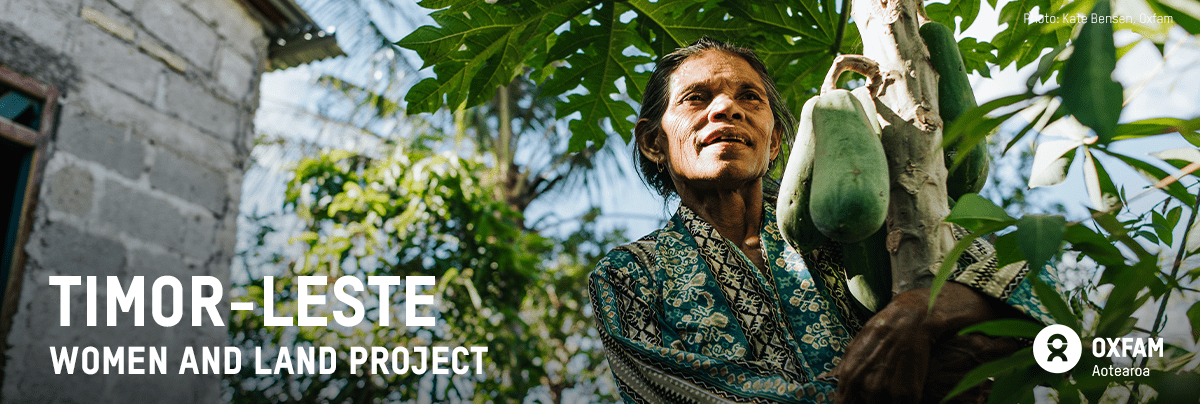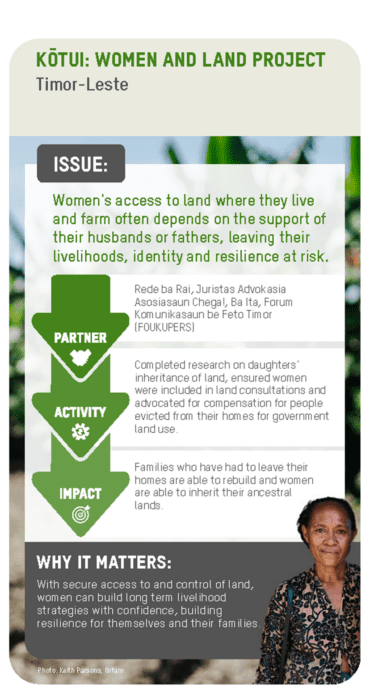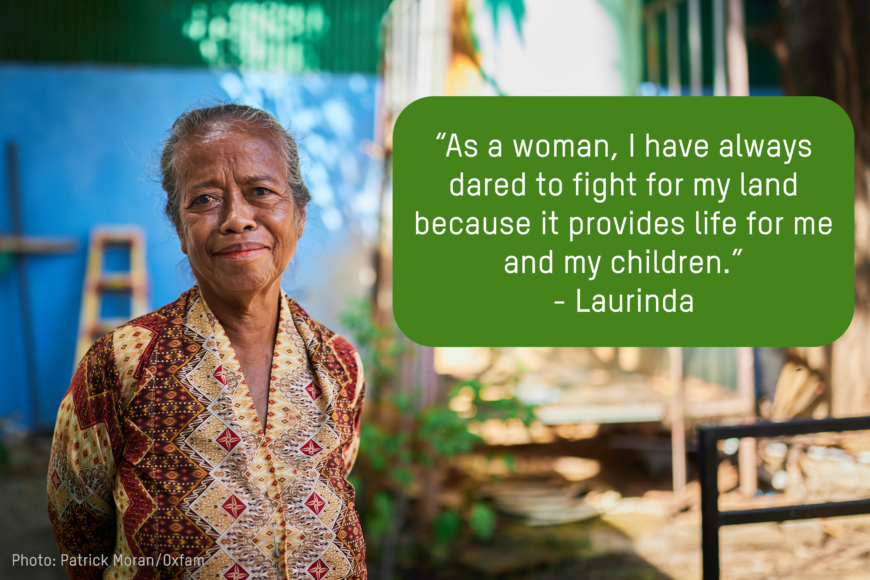
Though gender equality is guaranteed in the Timorese constitution and there are high levels of women’s political representation in Parliament, women’s leadership within political parties remains low, and the composition of parliamentary committees is highly gendered.
Additionally, women’s mobility, security, advancement and voice are influenced by a range of highly restrictive patriarchal social norms. Women frequently have less control over the assets on which their livelihoods depend, especially land.

KŌTUI
Timor-Leste Women and Land Project is part of our larger five-year, multi-country programme, Kōtui. Read more about Kōtui here!
This te reo Māori word means binding together, or interlacing, during weaving. The woven mat represents dialogue and joint problem-solving in Pacific countries and in Timor-Leste. It is an appropriate symbol for a programme focused on inclusive and equitable governance.

Land rights
Access to land is central to life and resilience in Timor-Leste and across the region. Over 90% of the population of Timor-Leste is involved in some form of agricultural activity. With the vast majority of the population depending directly on customary land for agricultural livelihoods, and limited social security systems, land is the most important social safety net for Timorese communities, and is central to identity, culture, social cohesion and resilience.
Stronger land rights laws
Timor-Leste passed its first ever land law in 2017, and although the law itself is reasonably equitable, the process of land registration hasn’t lived up to that standard. The government is drafting over 18 subsidiary laws and policies on land. Oxfam’s work will include: gendered analysis of the land sector, drafting evidence-based submissions on relevant land laws; and creating forums for dialogue between Civil Society Organisations, government stakeholders, and the public (specifically women).
Increased recognition of rights
An important aspect of improving women’s land rights will be making sure that formal and informal leaders recognise the how important it is that women have these rights in the first place. This will be achieved through training and reflection within our own organisations and allies; collaborative research, developing public campaign materials relating to women’s land rights, and sharing positive stories about ways in which Timorese customs and customary leaders can protect women’s land rights.
Strengthening women’s voice
This project will fund two partner organisations to drive work on the distribution of land rights information at the community level, alongside broader women’s empowerment work.
Improved civil society capacity
This project will seek to build bridges between women’s rights and land rights organisations through collaborative research and learning opportunities. While there are Timorese CSOs that are strong on land rights and those that are strong on women’s rights, there aren’t currently many people, or organisations, who have a deep understanding of both. Resources, technical expertise, and institutional support, will lead to more sustainable and stronger Civil Society Organisations and networks.

Laurinda’s Land: A Story of Resilience and Justice in Timor-Leste
Laurinda, a widow and farmer from a small village in Dili Municipality, has faced years of struggle to protect her land. Laurinda’s livelihood depends on her land, which has sustained her and her five children since 1997. In 2018, three years after the death of her husband, her neighbour attempted to for her off the land by installing power lines and cutting down her fruit trees. Laurinda stood firm despite his threats, knowing the land was rightfully hers. Though the dispute is not fully resolved, Laurinda is now able to live on her land in peace, thanks to the support of her community and the Oxfam’s programme partner, Rede ba Rai.
The Kōtui project has played an integral role in supporting women like Laurinda in defending their land rights, empowering them to stand up against injustices and securing the livelihoods of their families.
LATEST UPDATES
In Timor-Leste, Oxfam’s partnership between Rede ba Rai, ACbit, Fokupers, and Juristas Advokasia has made remarkable progress in empowering women and enhancing their understanding of land rights. Through targeted training, legal education, and advocacy efforts, these organisations have significantly improved women’s ability to defend their land rights. Notably, 30 women survivors of past conflicts have been trained on land ownership rights, equipping them with the knowledge to advocate for their entitlements. Legal consultations have been provided to vulnerable communities, particularly women facing land disputes, further strengthening their position in these matters.
A headline activity was action research on daughters’ inheritance of land in patrilineal areas. Recognising that inheritance is probably the most common way the women come to own land in Timor-Leste, Oxfam and partner staff interviewed six families in five different municipalities, to get a better understanding of the enablers and barriers to daughters’ inheritance. As well as providing significant learning and data on this topic, the research topic also demonstrates a growing focus on the customs and norms that impede women’s enjoyment of their land rights. In terms of social impact, while structural shifts in land inheritance norms are still a work in progress, some communities have become more receptive to challenging traditional gender roles. Gender-transformative training has led to more equitable land practices, such as registering land in women’s names, marking a significant step forward in women’s legal recognition and access to land in Timor-Leste.
Overall, the project’s work has had a significant and lasting impact, empowering women to defend their land rights, advocating for policy change and shifting social norms around gender and land ownership in Timor-Leste.
Focus on partners
Rede ba Rai (RBR) is a long standing national level civil society network which advocates for just and sustainable land rights for all Timorese people. RBR members, working together with community representatives, made a compelling contribution to the development of the 2017 Land Law, a momentous win for land rights in Timor-Leste.
Juristas Advocasia is a legal aid and paralegal organisation that provides training for communities on legal issues, provides legal aid for communities facing complex land issues, and undertakes analysis and advocacy relating to land laws and policies. Juristas Advocasia was intimately involved in Rede ba Rai’s research on land registration which highlighted the negative impacts of the land registration process on women’s rights.
Asosiasaun Chega! Ba Ita (ACbit) is a small and active NGO in Dili, Timor-Leste which aims to support women survivors with trauma healing workshops, increase women survivor’s capacity through nutrition and business training, lobby for the recognition of women survivors by relevant government and non-government bodies, educate the public on women’s history, human rights, and gender-based violence in the past and present.
Fokupers is a not-for-profit organisation with the aim of empowering Timorese women that has been operating for almost twenty years. Fokupers’ mission is to end violence, starting from individuals and moving to an institutional level, through the movement to empower women in all aspects with integrated services, so that women and men are aware, understand, and have the skills to overcome the problems of injustice and gender inequality.
By the end of the five-year Kōtui programme…
We expect to see the following improved governance outcomes:
More laws, policies and programmes that provide protections for women’s land rights
Land registration processes that protect and uphold women’s land rights
Women’s voices included in more policy processes relating to land at national and community levels
Policy processes increasingly use a stronger evidence base on women’s land issues
Strengthened collaboration between civil society and government on women’s land issues





